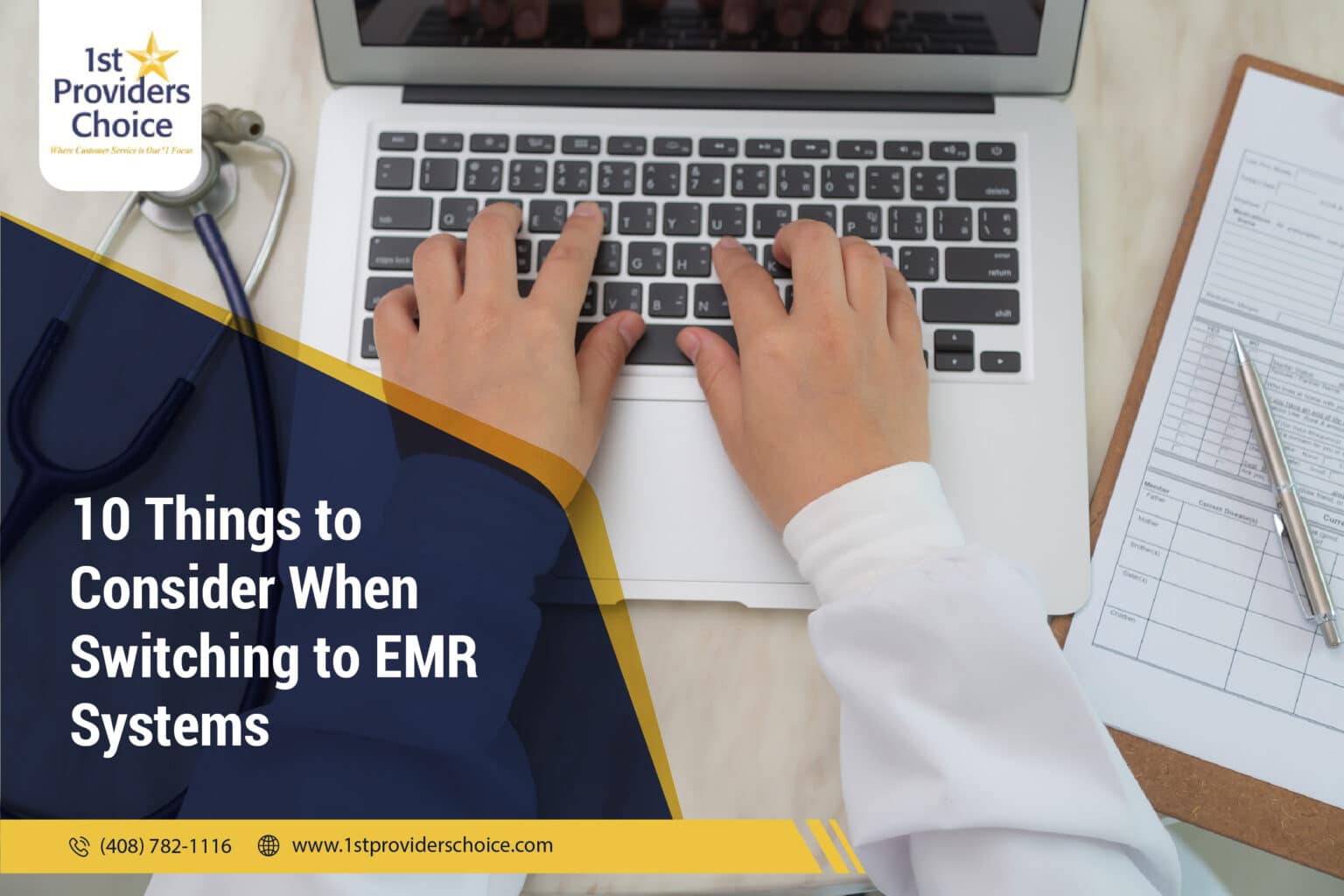10 Things to Consider When Switching to EMR Systems
Posted by 1st Providers Choice on

Are you considering switching to EMR systems? As healthcare advances at an unprecedented pace, it can be daunting to manage your practice while trying to deliver optimal services to your patients at the same time. The following are the main considerations that you should take into account when deciding on an EMR system:
Check the Testimonials
One of the easiest ways to check the trustworthiness of a product is by listening or speaking to their active clients. Check their testimonial page and arrange a phone call with a colleague to ask them personally about their experience with the system.
Quality Training and Support
Make sure you have access to qualified professionals that give guidance on compliance and software training, both online and in-person. Be sure that the provider you chose also provides comprehensive training and support services that will accommodate you every step of the way for maintenance and assistance years later. Some firms have an IT team that teaches clients, but a team with real-world clinical knowledge will separate one provider from another.
Data Transfer
Data transfer and retention commonly occurs when you are moving your data from your old EMR system to a new one. There are many methods for managing this operation, and a total information transfer may sound desirable. However, a total transfer may be the least cost-effective. Nevertheless, the thought of moving to a better EMR system will further outweigh the hassle and worries of data migration. Choose a provider that is willing to offer alternatives for further flexibility that won’t hinder your operations.
Demos and Conferences
To see is to believe. Reading about a specific product or new technology is one thing, but watching it in person will bring a whole new dimension and enhance your decision making. Take the time to discover more about the EMR channels that appeal to you. Attend webinars, presentations, conferences, either online or in person, with multiple companies to determine the benefits and disadvantages of their EMR system. Initially, you will make a more refined decision by contrasting EMRs on your own. Industry conferences offer an opportunity for you to learn more about EMR programs and meet with representatives of the organization that better explains their systems to help you reach a decision.
Company Background
Technology and healthcare are both evolving sectors, and developments are rapid. Thus, choose an organization with proven stability and an established track record. You can determine a company’s trustworthiness from its growth, financial stability, ownership, and other significant milestones. An innovative business should adapt quickly to the needs of the healthcare industry.
Costs Evaluation
In general, you get what you are paying for in software and technology. Always be cautious about selecting the “cheapest” alternative–a decision that might damage your operations and finances. Understand that it will be a long-term commitment that can enhance or hinder the longevity of your company for years to come.
Cloud-based system vs. Server-based system
Cloud software as a service ( SaaS) is far more efficient than a server-based system. It has cost-saving capabilities and eliminates the need to buy new EMR computers, hardware, workstation licenses, or adding additional workers. A cloud-based EMR system‘s versatility and flexibility allow you to manage your practice from practically anywhere and anytime as long as you have a stable internet connection.
Specialty-specific EMR System
Generally, one system doesn’t accommodate everything. Thus, look for a user-friendly EMR system that is tailored to your specialty. If you are a dermatologist or a neurosurgeon, having an EMR system built for a general practitioner or ophthalmologist won’t suit your workflow. Aim for a system that has an adaptive learning engine framework that can sync to your routine and priorities, saving time with each patient.
Needs Assessment
Here are some guide questions that you can ask yourself and the stakeholders of your practice:
- How many providers and users can platform support?
- Can an existing staff assist in the EMR system transition and implementation, or do you need to recruit someone else?
- How much support would the team need to reach optimum performance in clinical operations?
Answering these questions will help prepare you for the decision-making phase ahead.
Timing and Costs assessment
The right time for change differs for any practice. There are a lot of factors to consider, like expenditures, human resources, and other bureau logistics that play an important role. The reforms to regulatory legislation and the move to care-based treatment also contributes to the need for advanced technologies, particularly for your EMR framework. It would be difficult to convince your fellow stakeholders. However, do not allow it to deter you from looking for a new EMR system that can save time, reduce costs, increase revenue, and exceed standards.
Providing you with the Best
At 1st Providers Choice, we understand our clients’ needs and expectations. That’s why we only offer the best EMR system features, allowing your practice to operate at its optimum potential.
You can call us at (480) 782-1116 for immediate assistance, or you can schedule a free demo with our experts TODAY.